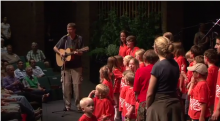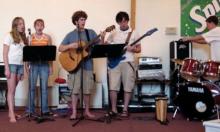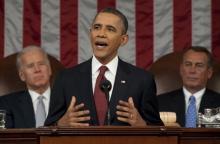Education

Bralyan loves bugs.
I met him during the first week of school as I conducted the standard assessment of how many words he could read per minute from a second-grade story. After the assessment, I gave him the customary caterpillar sticker to put on his shirt to show everyone that he was going to emerge as a great reader during his second-grade year.
You would have thought that I had given him a piece of gold.
"Oooh, I love bugs," he marveled as I handed him the sticker. "I have seen caterpillars around the trees at my apartment. They spin a chrysalis and turn into butterflies.
“Have you seen a roly poly bug?,” he continued. “They're my favorites!"
And so a friendship began around the pyrrharctia isabella, the armadillidum vulgar and other bugs that make up the most diverse group of animals on the planet.
This interaction told me some crucial things about Bralyan. It told me he is a smart kid, and it also told me that keeping him engaged in school would likely include bugs.
I later learned that Bralyan and his family moved here from Mexico when he was a baby. His mom and dad speak only Spanish at home. He speaks English at school.

Being a teacher is like being a farmer. You rise early in the morning. You irrigate and fertilize the field that is your classroom. You plant the seeds that are reading, writing, and arithmetic. You hope for good soil, warm sunshine, and gentle rain that are good homes, healthy foods, and adequate healthcare for your students. You work with your hands, feet and heart with your plants who are your students.
Your harvest is your students.
Your winter season of fallow fields is your summer break of empty classrooms.

I try to teach in the present. With Billy, though, I found myself thinking about the future. Will middle school be a challenge for him? Will he be an outcast in high school? Or a target for bullies?
I wondered what contributions he might make to society as an adult. Would he start a revolution in the art world?
If his peers constantly slap their hands down and say there's no room for him, how will he react? Will he become a part of what author Alexandra Robbins calls the "cafeteria fringe,” those people who are not a part of the school's or society's in-crowd? Because he seems different, will he be labeled “geek,” “nerd” or “weirdo?”
As a teacher I want to help him overcome. But what can I do?

Baseball players Larry Doby was black and Steve Gromek was white. Gromek was from the working-class culture of Hamtramck, Mich., and Doby from the Jim Crow culture of Camden, S.C.
One year earlier, on July 5, 1947, at Comiskey Park in Chicago, Doby had become the second African-American behind the great Jackie Robinson of the immortal Brooklyn Dodgers to play for a major league baseball team and the first African-American to play in the American League.
It was a revolutionary picture because it showed the world a way white supremacy and racism could be overcome.
Ask a random group of people, “How do we improve our public schools?” and you’re apt to get divergent, passionate answers. Christians, like other citizens, have different opinions on how to heal what’s hurting in our education system. What we can share is a belief that all children are truly precious in God’s sight and an understanding that public education is a key component of the common good—that a healthy school system has the potential to bring opportunity and uplift to children regardless of their economic status.
Jan Resseger is the minister for public education and witness with the national Justice and Witness Ministries of the United Church of Christ. She spoke with Sojourners associate editor Julie Polter in June.
Sojourners: Why is public education a commitment for the United Church of Christ?
Jan Resseger: The commitment to education is a long tradition for us. Our pilgrim forebears brought community schooling and higher education to the New England colonies—New England congregationalism is one of our denominational roots. Another root is the American Missionary Association (AMA), an abolitionist society that grew out of the defense committee for the Africans on the slave ship Amistad. The AMA founded schools for freed slaves as a path to citizenship across the South during and after the Civil War.
Several denominations came together as the UCC in 1957, and our general synods since then have taken stands on issues such as the protection of the First Amendment in public schools and supporting school desegregation through the ’60s, ’70s, and ’80s. From 1958 to the present, we have spoken to institutional and structural racism and classism in schools. We also have addressed privatization, because we’ve been strong supporters for many, many years of public schools as key to the strength of our society and democracy.
JUST OVER A year ago, I attended a retreat sponsored by the Fund for Theological Education. During the retreat we were encouraged to look at our lives and to find a personal story that captured the essence of what led us to our particular ministries. That led me to reflect on my childhood: growing up in poverty, attending a different school every year, walking to school with cardboard in the bottom of my shoes because the soles were worn out, wondering how I was going to eat, lacking school supplies at times, and dealing with the stress of a single mother who was a substance abuser.
By reminding me of those things I endured and had to overcome as a child, that exercise helped me tap into my real passion. I wanted to find ways to help children growing up in similar circumstances. I wanted to inspire them to believe in themselves and know that they can make it.
At-risk youth and under-performing students need to be inspired, but equally important is their need for adults who are willing to do the work of helping them succeed academically. Education continues to be our most reliable tool for creating upward life trajectories and optimal opportunities. Churches are more than places where people come in search of a deeper relationship with God; they are also places where people come to find deeper connections with their communities and the possibility of using their gifts and talents to help those in need.
All these forces together compelled me to act on an idea I had more than a year ago: to call on friends from across the country to help create Faith for Change. Faith for Change builds a national network of churches and people of faith committed to implementing proven educational strategies for improving children’s lives.
Whether encouraging children to succeed, caring for elders at the end of life, or investing in struggling communities, strong families can make all the difference. Unfortunately, our broken immigration system often negatively affects families, increasing both their emotional stress and financial burden. Too often our laws actually separate family members from each other in ways that create lasting damage.
Recently, the federal government announced a policy change designed to keep families together as they navigate the process of applying for green cards. While this shift will also streamline the process and reduce the complexity of application, the new rules can still be confusing to those seeking help. That is why the Interfaith Immigration Coalition is working to educate the faith community about these developments. On September 10, the Coalition will host a webinar from 4-5 p.m. EDT for faith leaders interested in learning more. Take this opportunity to hear from policy experts, legal advocates, and faith leaders about this important topic.
When: Monday, September 10th from 4- 5 p.m. EDT
Where: Phone
RSVP here.

I love to receive letters. When I was a little boy, I lived on a long, straight street and I could see the mail truck coming from a long way off. After the mailman stopped in front of our house, I ran with hope in my heart down our front walkway, between our two giant maple trees and across the street to our mailbox. Would there be a letter for me? Was someone in the world thinking of me?
One day last year it was not the mailman, but a second-grader on the school playground, who handed a letter to me. I unfolded it.
"Dear Mr. Barton, hi it Odeth from 2th grade I miss you a lot I wanted to know about you so much I am being good I am in 4th grade Do you miss me. I live in __________ I go to school in __________ I hope you will come to my school … can you come visit me in school ask for my name…I am 10 year old I want you to come to my school.
Your best student,
Odeth"
What a wonderful thing, to be remembered by a student.

Imani walked down the hall with a paper cup in her hands.
She stopped and held up the cup to me. Inside of its paper walls were soil, water, and seeds — all those humble and elemental things that build a third-grader's scientific knowledge.
Imani was growing cabbage.
She was my student last year. She loved science and writing. I remember the look of wonder in her eyes when we studied weather. We learned about tornadoes. In my classroom, I had two 2-liter bottles connected by a tornado tube, a plastic piece that allows you to make a tornado by swirling the water around and around in one of the bottles. Imani held the bottles in her hands and marveled as her water formed into a giant, powerful funnel cloud.
"Wow," she whispered.
I love the sound of learning.

In Roald Dahl's classic children's book James and the Giant Peach, 7-year-old orphan James Henry Trotter escapes his two rotten, abusive aunts by crawling into a giant peach. The peach rolls, floats, and flies him to a new life of wonder and love.
I'm reading this book aloud for the first time, and my listeners are spellbound by the story, especially the part where the very small old man opens the bag filled with magical crocodile tongues that will help a barren, broken peach tree grow fruit as big as a house.
"There's more power and magic in those things in there than in all the rest of the world put together," says the man.
There is.
“What do you want to be when you grow-up?” is the pressure filled question that people begin asking as soon as they feel young people are old enough to answer.
From there it only gets worse. It’s a question I hated answering. Adults and media filled my mind with careers that would make me financially secure and, in their minds,  happy. So these careers filled my answers: doctor, lawyer, and pharmacist. I would be something important, and life after college would be financially easy.
happy. So these careers filled my answers: doctor, lawyer, and pharmacist. I would be something important, and life after college would be financially easy.
I babysat often through high school and remember a mom asking the dreaded questio

This year, as we start Sunday School and churches come back from summer schedule, I want to introduce you to one of my favorite singer/songwriters, Bryan Moyer Suderman. It’s rare that you find music that appeals to all ages with a strong social justice focus, healthy theology, inclusive language, environmental concern, and really good musicianship.
As Brian McLaren and Dave Csinos wrote in the intro to Bryan’s new CD:
Bryan takes up the challenge of uniting the old and the young, the tall and the small, with songs of faith that echo the depth, beauty, struggle, complexity, and unconventionality of walking in the way of Jesus.
Bryan is a minstrel, a prophet, a visionary, and a follower of Jesus who invites listeners of all ages to join him in “infiltrating the world with the love of God.” His music is captivating, his lyrics are theologically-rich and thought-provoking, and his voice invites us all to live God’s kingdom wherever we are.

Editor's Note: Over the next two weeks, Sojourners is celebrating our teachers, parents, and mentors as children across the country head back to school. We'll offer a series of reflections on different aspects of education in our country.
My elementary school is a Title I school. About 97 percent of our students qualify for free and reduced lunch and Medicaid. Research shows us that many children raised in poverty struggle to learn to read. 
Common sense tells us that children who don't learn to read can't read to learn. They often reach a frustration level with school by the time they're in the third grade. According to the U.S. Department of Education, 70 percent of low-income fourth-grade students can't read at a basic level. I often wonder, "What can I do in my day-to-day work as a teacher to help?"

Every morning at 7:15, the doors of our school open wide to a line of bus riders ready to come inside. "Hello, Jaheem. Hi, Kiara. Hey, Imani. Hope you're having a good day, Omar," I call out as the students walk past me to the cafeteria for breakfast. I stand at the doors for a moment and watch the big, yellow buses puff their diesel exhaust and chug their way to the garage until it's time for their afternoon run.
Is there a more universal symbol for public schools than a big, yellow school bus?
We who nurture the life of children could be compared to gardeners, conscientiously serving the God-given stages of the growing plant. We seek to support its development as a seedling, a young plant, and a fruit-bearing or mature plant.
However, Christian educators of young children often begin to water, weed, and prune without first observing children to grasp the stages of their relationship with God. God has planned human and spiritual growth just as well as God has prepared plant growth.
Catholic scholar Sofia Cavalletti and her collaborators Gianna Gobbi and others around the world and in many denominations have carefully observed the stages of newborn to 12 year-old children’s relationship with God, and they have developed an approach to religious formation, called the Catechesis of the Good Shepherd, that serves those stages well. The encounter with God over the years includes coming to know God who is love, God who is personal, and God who is just and merciful, as these and other aspects of God match the developmental strengths of the growing child.
Here is that development and its implications in very broad strokes:
- Ages 0 to 6. Young children are in a relationship of love with God. This begins with life. This time is one of joy. For the young child, Christianity is not about doing good, but about being in love with Jesus. We serve this period with parables such as the good shepherd, the found sheep, the mustard seed, the pearl of great price, and the leaven, as well as the narratives of the birth of Christ, the Last Supper, and the women at the tomb. The signs of God’s presence through water, bread, and wine are also introduced according to the practice of each congregation.
For The Huffington Post, Robert Gallucci writes:
Around the world, 35 million girls who should be in primary or secondary school are not; half of them are in sub-Saharan Africa, according to the World Bank. For those of us committed to addressing global poverty, improving education for girls may be the closest thing to a silver bullet.
Read the full piece here

Last Friday, on his weekly show Real Time with Bill Maher, the not-so friendly atheist, Mr. Maher took issue with the Santorum families decision to homeschool their children. Here’s what he said:
"But I bring up the old tale of the poisoned apple — no, not "Snow White," that's a fairy tale — because the Adam and Eve story is taken literally by half the country and it's no coincidence that the type of tree which god forbade Adam and Eve eating from was the Tree of Knowledge. Rick Santorum homeschools his children because he does not want them eating that f--king apple. He wants them locked up in the Christian madrassa that is the family living room not out in public where they could be infected by the virus of reason. If you're a kid and the only adults you've ever met are mom and dad, and then they're also the smartest adults you've met, why not keep it that way? Why mess up paradise with a lot knowledge? After all, a mind is a terrible thing to open."
Santorum took exception to these comments. For good reason.
My parents made the decision to homeschool three out of four of their children at some point during our K-12 years. They invested both time and resources because they believed it was the best thing they could do for our development and education at that time.
Earlier this week, I wrote about how nostalgia expressed in contemporary politics points to the privilege of those longing for the “good old days.” In doing so, I stumbled onto a theme I’ve decided to explore throughout the week. Namely, I’m interested in how it is that inspired vision – unconstrained by “what ifs” or fear of change – might break down barriers to opportunity and help overcome systemic privilege that holds some people back from realizing the same potential as others who are more fortunate.
I wrote an article a little while back about the lingering effects of colonial power on institutional education, and how it continues to limit access for those without certain privilege to connect with it. Well, it turns out there are some folks already trying to do something about this, and it’s pretty exciting.
Sebastian Thrun, a professor at Stanford in computer science, worked recently with Google to create a revolutionary self-driving car. As if this wasn’t enough, Thrun went on to develop an idea that would at once shift the educational landscape across the planet.

From President Obama's 2012 State of the Union Address:
The defining issue of our time is how to keep that promise alive. No challenge is more urgent. No debate is more important. We can either settle for a country where a shrinking number of people do really well while a growing number of Americans barely get by, or we can restore an economy where everyone gets a fair shot, and everyone does their fair share, and everyone plays by the same set of rules. (Applause.) What’s at stake aren’t Democratic values or Republican values, but American values. And we have to reclaim them.
Let’s remember how we got here. Long before the recession, jobs and manufacturing began leaving our shores. Technology made businesses more efficient, but also made some jobs obsolete. Folks at the top saw their incomes rise like never before, but most hardworking Americans struggled with costs that were growing, paychecks that weren’t, and personal debt that kept piling up.
Read the full text of the SOTU Address inside the blog...

Obama To Take On Economic Anxiety In Election-Year State Of The Union, Amid GOP Attacks; Black, Latino Students Perform At Levels Of 30 Years Ago; Obama Offends The Catholic Left; Evangelicals And Romney: Should Theology Matter?; What’s Up With The Arab League?; "Self Deportation": It's A Real Thing, And It Isn't Pretty; Who Are Boko Haram and Why Are They Terrorizing Nigerian Christians?; 2011 Annual Letter From Bill Gates; Florida GOP Debate: Immigration Proposals Anger Protesters; An Occupy Prayer Breakfast: There Is Enough For Everyone!; Violence Spikes In Key Afghan Regions.